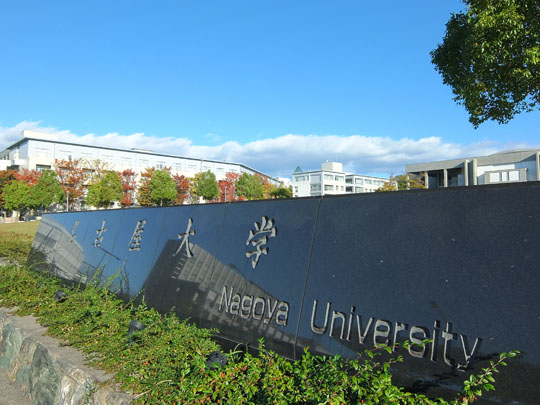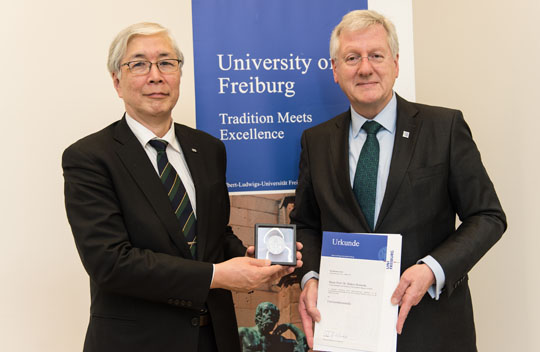Key partnership in Japan
Freiburg, May 04, 2017
An international partner who we can exchange people and ideas with in many areas; who supports applications for funding programs; and with whom we can conduct joint research and teaching in core subjects: The University of Freiburg has maintained a key partnership with Nagoya University in Japan since 2010. Freiburg also has key partnerships with Pennsylvania State University in the US, Nanjing University in China, and Université de Strasbourg in France. Claudia Füßler presents these partnerships in a series. Here: Nagoya.
The contacts Freiburg researchers have with their colleagues in Japan go back to the 1950s. Nagoya University was founded in 1939 as an Imperial University. "We know that back then, it was the discipline of Economics which was primarily active in the exchange. Members of the universities met every two years either in Freiburg or in Nagoya. That is still the case today," says Kathrin Jehle of the University of Freiburg's International Office. She has been responsible for the Freiburg side of the key partnership with Nagoya since 2010.
 Nagoya is one of eleven state universities sponsored by the Japanese government as a Top Global University. Photo: Kathrin Jehle
Nagoya is one of eleven state universities sponsored by the Japanese government as a Top Global University. Photo: Kathrin Jehle
At the start of the new millenium, the existing contacts were stepped up. Today, there are exchanges with Japanese researchers in a number of areas. German and Japanese legal experts, chemists, biologists, medical researchers, and of course the economists work together, sharing not just their knowledge, but also students and academic staff. "Existing cooperations are always developing, other disciplines are only now getting together," says Jehle. That includes physics and the social and political sciences. "There is a special call for proposals aimed at promoting research projects at both universities."
 The vice-president of Nagoya University, Professor Hideyo Kunieda (left), received the University of Freiburg Medal in March 2017 from Rector Professor Dr. Hans-Jochen Schiewer. The Rector praised the many years of dedication with which Hideyo Kunieda has pursued the key partnership between the two universities. Photo: Patrick Seeger
The vice-president of Nagoya University, Professor Hideyo Kunieda (left), received the University of Freiburg Medal in March 2017 from Rector Professor Dr. Hans-Jochen Schiewer. The Rector praised the many years of dedication with which Hideyo Kunieda has pursued the key partnership between the two universities. Photo: Patrick Seeger
A European Center in Freiburg
That funding is managed in Freiburg via the Freiburg Institute for Advanced Studies (FRIAS), which has close contacts with its Japanese opposite number, the Institut for Advanced Research (IAR), in Nagoya. "Also, Freiburg is home to Nagoya University's European Center. My Japanese colleague there is responsible for all activities in Europe and for the key partnership with Freiburg in particular," Jehle says. "Of course, that makes cooperation much easier."
Nagoya University initiated the Academic Consortium 21 (AC21) in 2002 - and international network whose members are 24 world leaders in research and teaching. The University of Freiburg is one of them. "Both the partnership with Nagoya and the collaboration with other universities in the network have taken on a new, multilateral dimension," Jehle enthuses.
World class research
For many years, students from Nagoya have been learning and conducting research in Freiburg and vice versa. "It is not just a gain in knowledge - you understand the cultural aspects much better," says Professor Bernhard Breit of the Institute of Organic Chemistry. "The Japanese virtually live in their laboratory; the pressure of work is disproportionately higher than it is here. Getting to know that is an important part of intercultural education."
Breit and his Japanese colleagues are currently researching the subject of "Supramolecular catalysis for sustainable chemical synthesis." "We want to find out how certain chemical reactions can take place using as little energy as possible," Breit explains. And with the smallest possible amount of byproduct. Sustainability in chemistry means, among other things, that two building blocks join to make a third - without any fourth or fifth element arising which is not required. "For that you have to define the right catalyst," says Breit. That's exactly what two German-Japanese working group are trying to do. "We are doing world class research here - and of course, that is great fun, and very interesting."
For Nobel laureates in ten years
Nagoya is one of eleven state universities sponsored by the Japanese government as a Top Global University - a project analogous to Germany's Excellence Initiative. It has produced four Nobel laureates in the past ten years. "Our colleagues there are justifiably proud of their university," Jehle says. "It is a major boon to the cooperation between Nagoya University and the University of Freiburg that both partners can share their strengths and develop them together."
Nagoya University's European Center

